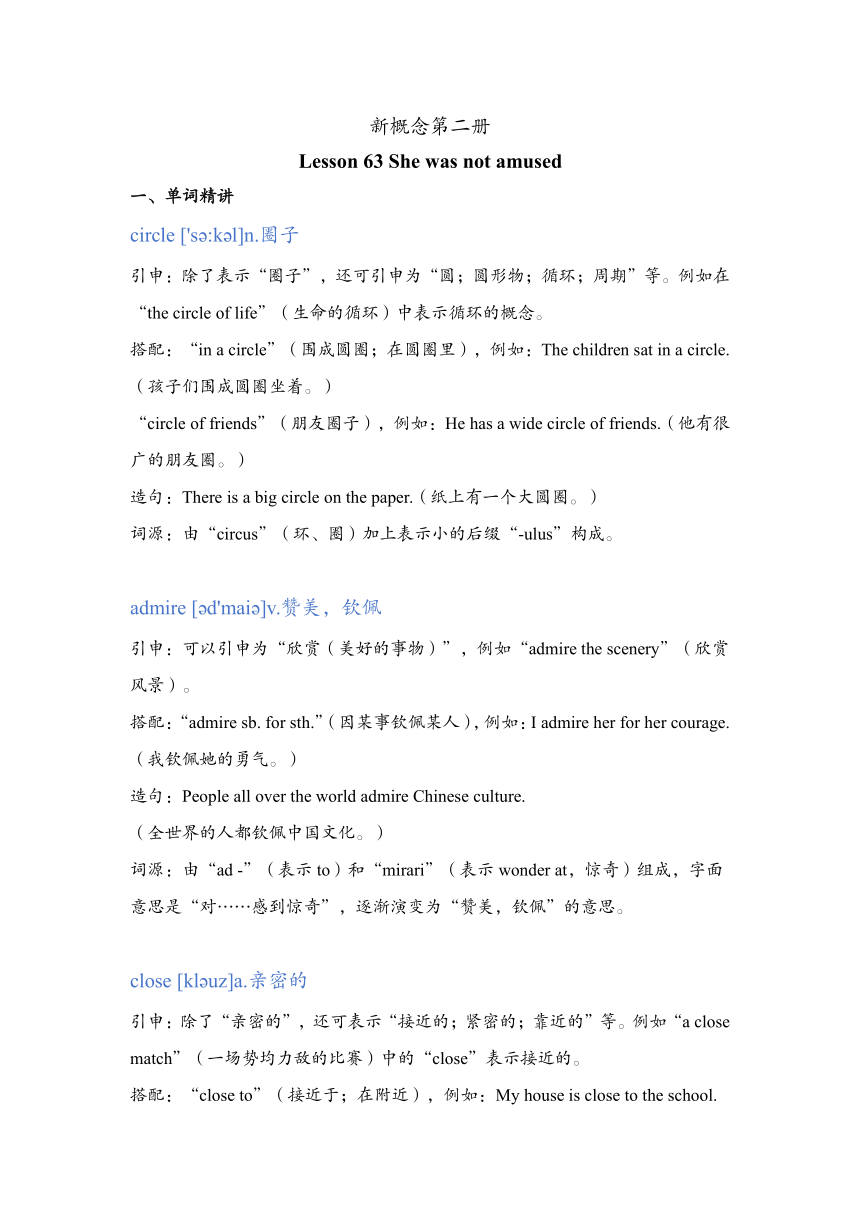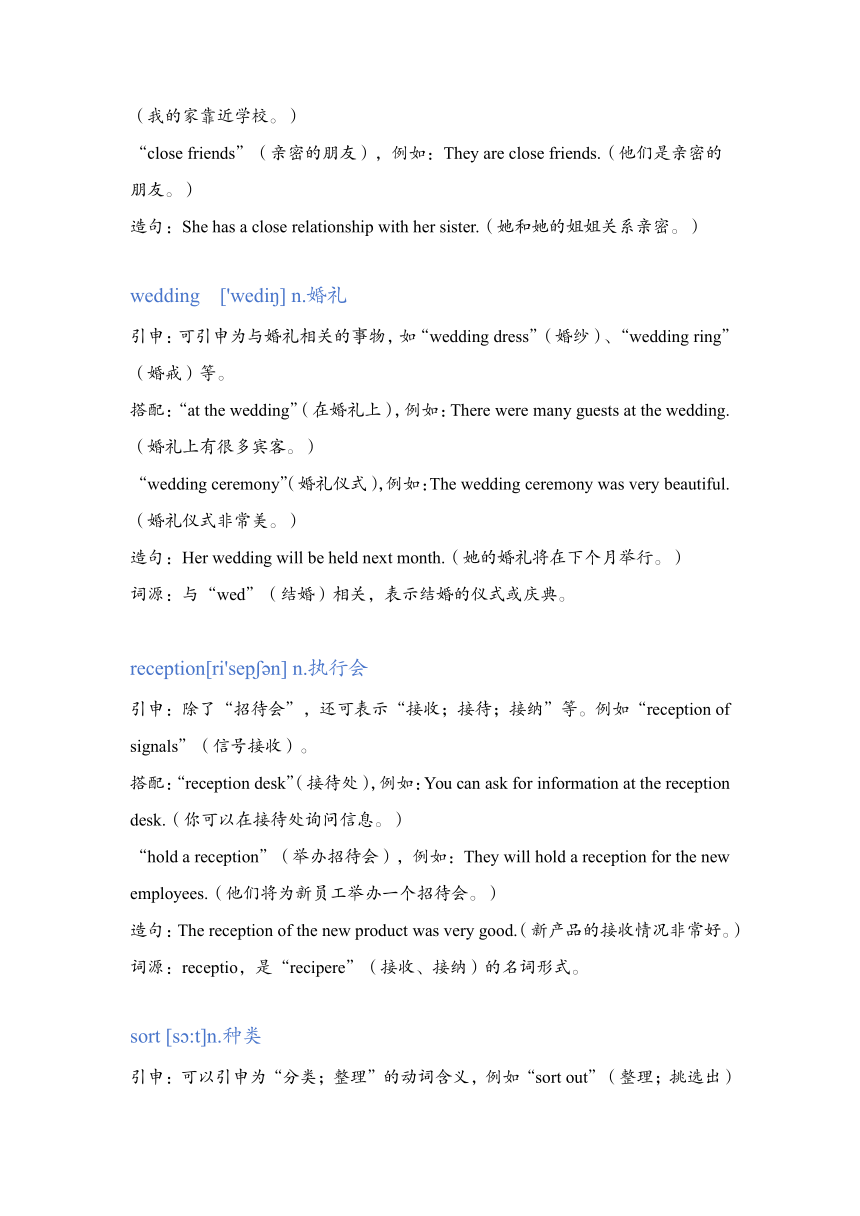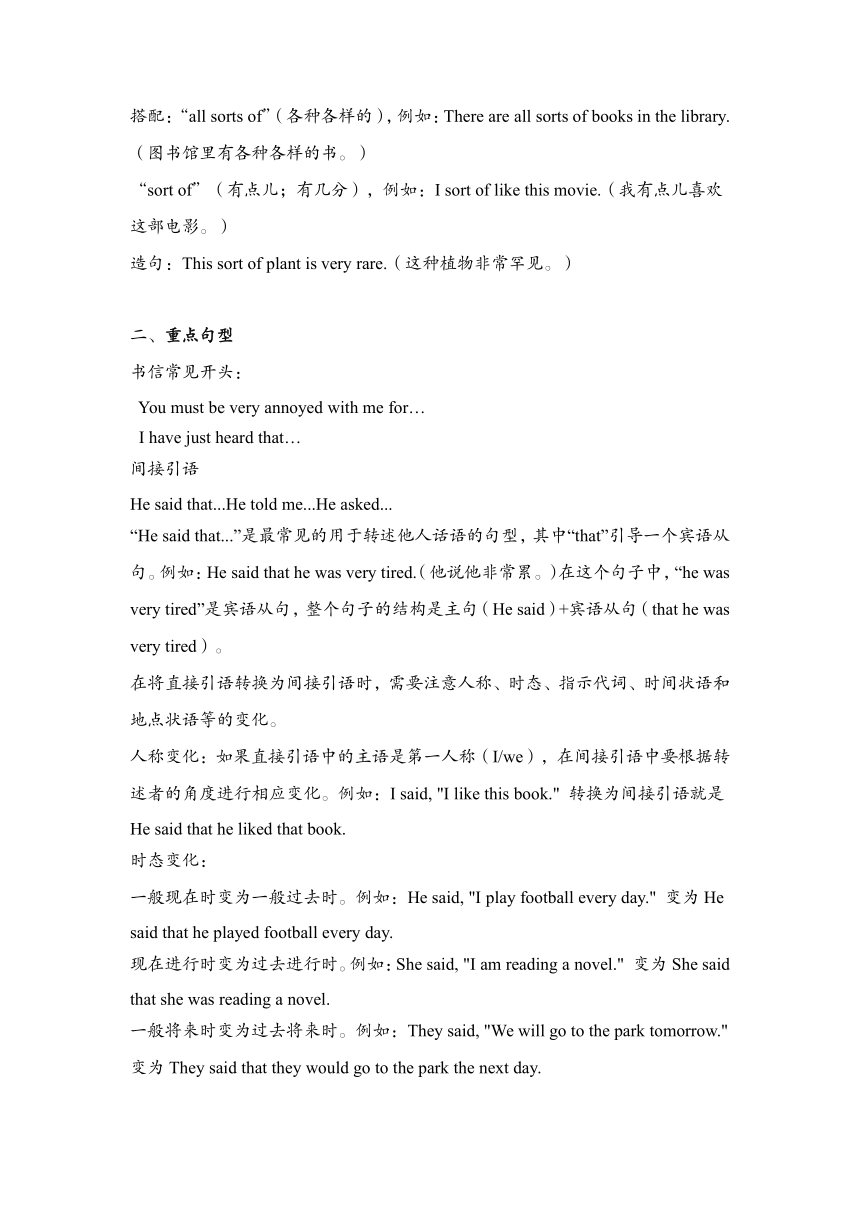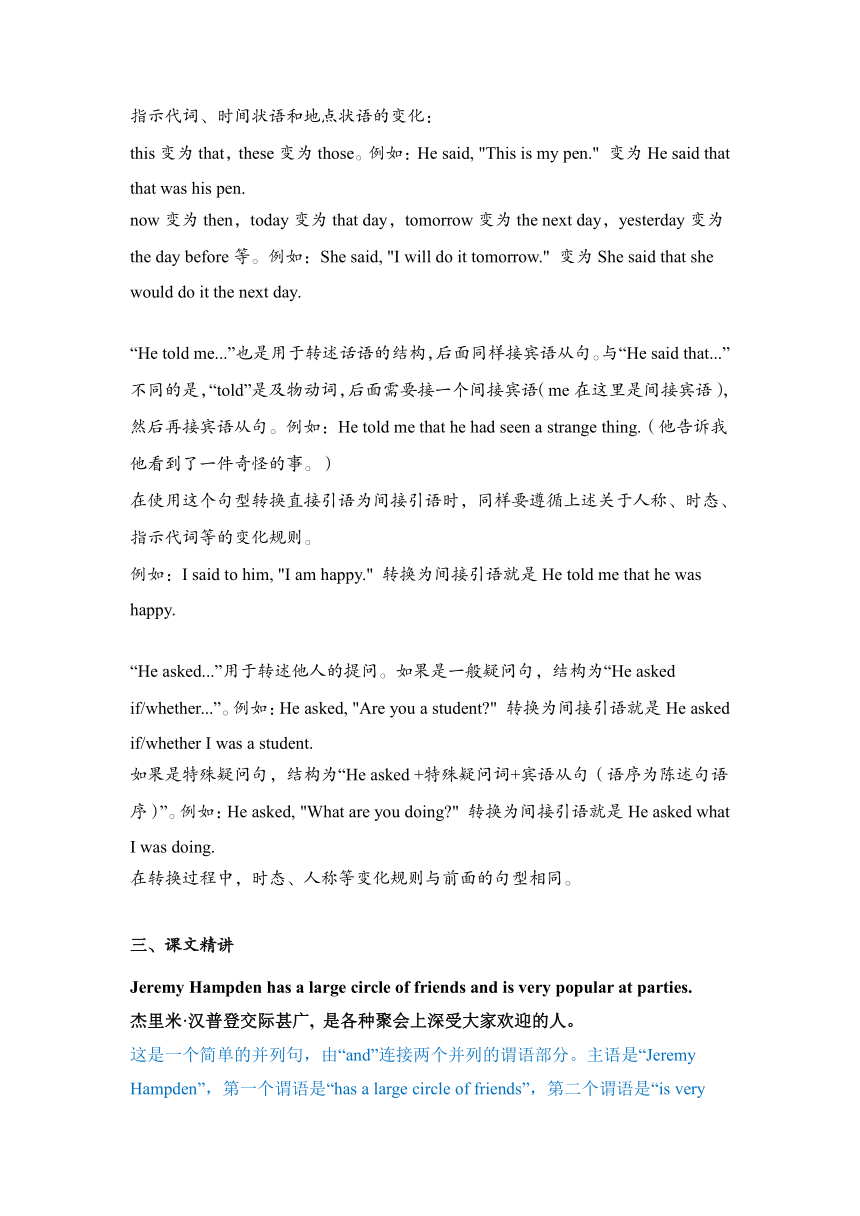新概念第二册Lesson 63 She was not amused讲义
文档属性
| 名称 | 新概念第二册Lesson 63 She was not amused讲义 |  | |
| 格式 | docx | ||
| 文件大小 | 107.8KB | ||
| 资源类型 | 教案 | ||
| 版本资源 | 新概念英语 | ||
| 科目 | 英语 | ||
| 更新时间 | 2024-11-23 20:58:36 | ||
图片预览




文档简介
新概念第二册
Lesson 63 She was not amused
单词精讲
circle ['s :k l]n.圈子
引申:除了表示“圈子”,还可引申为“圆;圆形物;循环;周期”等。例如在“the circle of life”(生命的循环)中表示循环的概念。
搭配:“in a circle”(围成圆圈;在圆圈里),例如:The children sat in a circle.(孩子们围成圆圈坐着。)
“circle of friends”(朋友圈子),例如:He has a wide circle of friends.(他有很广的朋友圈。)
造句:There is a big circle on the paper.(纸上有一个大圆圈。)
词源:由“circus”(环、圈)加上表示小的后缀“-ulus”构成。
admire [ d'mai ]v.赞美,钦佩
引申:可以引申为“欣赏(美好的事物)”,例如“admire the scenery”(欣赏风景)。
搭配:“admire sb. for sth.”(因某事钦佩某人),例如:I admire her for her courage.(我钦佩她的勇气。)
造句:People all over the world admire Chinese culture.
(全世界的人都钦佩中国文化。)
词源:由“ad -”(表示to)和“mirari”(表示wonder at,惊奇)组成,字面意思是“对……感到惊奇”,逐渐演变为“赞美,钦佩”的意思。
close [kl uz]a.亲密的
引申:除了“亲密的”,还可表示“接近的;紧密的;靠近的”等。例如“a close match”(一场势均力敌的比赛)中的“close”表示接近的。
搭配:“close to”(接近于;在附近),例如:My house is close to the school.(我的家靠近学校。)
“close friends”(亲密的朋友),例如:They are close friends.(他们是亲密的朋友。)
造句:She has a close relationship with her sister.(她和她的姐姐关系亲密。)
wedding ['wedi ] n.婚礼
引申:可引申为与婚礼相关的事物,如“wedding dress”(婚纱)、“wedding ring”(婚戒)等。
搭配:“at the wedding”(在婚礼上),例如:There were many guests at the wedding.(婚礼上有很多宾客。)
“wedding ceremony”(婚礼仪式),例如:The wedding ceremony was very beautiful.(婚礼仪式非常美。)
造句:Her wedding will be held next month.(她的婚礼将在下个月举行。)
词源:与“wed”(结婚)相关,表示结婚的仪式或庆典。
reception[ri'sep n] n.执行会
引申:除了“招待会”,还可表示“接收;接待;接纳”等。例如“reception of signals”(信号接收)。
搭配:“reception desk”(接待处),例如:You can ask for information at the reception desk.(你可以在接待处询问信息。)
“hold a reception”(举办招待会),例如:They will hold a reception for the new employees.(他们将为新员工举办一个招待会。)
造句:The reception of the new product was very good.(新产品的接收情况非常好。)
词源:receptio,是“recipere”(接收、接纳)的名词形式。
sort [s :t]n.种类
引申:可以引申为“分类;整理”的动词含义,例如“sort out”(整理;挑选出)
搭配:“all sorts of”(各种各样的),例如:There are all sorts of books in the library.(图书馆里有各种各样的书。)
“sort of”(有点儿;有几分),例如:I sort of like this movie.(我有点儿喜欢这部电影。)
造句:This sort of plant is very rare.(这种植物非常罕见。)
重点句型
书信常见开头:
You must be very annoyed with me for…
I have just heard that…
间接引语
He said that...He told me...He asked...
“He said that...”是最常见的用于转述他人话语的句型,其中“that”引导一个宾语从句。例如:He said that he was very tired.(他说他非常累。)在这个句子中,“he was very tired”是宾语从句,整个句子的结构是主句(He said)+宾语从句(that he was very tired)。
在将直接引语转换为间接引语时,需要注意人称、时态、指示代词、时间状语和地点状语等的变化。
人称变化:如果直接引语中的主语是第一人称(I/we),在间接引语中要根据转述者的角度进行相应变化。例如:I said, "I like this book." 转换为间接引语就是He said that he liked that book.
时态变化:
一般现在时变为一般过去时。例如:He said, "I play football every day." 变为He said that he played football every day.
现在进行时变为过去进行时。例如:She said, "I am reading a novel." 变为She said that she was reading a novel.
一般将来时变为过去将来时。例如:They said, "We will go to the park tomorrow." 变为They said that they would go to the park the next day.
指示代词、时间状语和地点状语的变化:
this变为that,these变为those。例如:He said, "This is my pen." 变为He said that that was his pen.
now变为then,today变为that day,tomorrow变为the next day,yesterday变为the day before等。例如:She said, "I will do it tomorrow." 变为She said that she would do it the next day.
“He told me...”也是用于转述话语的结构,后面同样接宾语从句。与“He said that...”不同的是,“told”是及物动词,后面需要接一个间接宾语(me在这里是间接宾语),然后再接宾语从句。例如:He told me that he had seen a strange thing.(他告诉我他看到了一件奇怪的事。)
在使用这个句型转换直接引语为间接引语时,同样要遵循上述关于人称、时态、指示代词等的变化规则。
例如:I said to him, "I am happy." 转换为间接引语就是He told me that he was happy.
“He asked...”用于转述他人的提问。如果是一般疑问句,结构为“He asked if/whether...”。例如:He asked, "Are you a student " 转换为间接引语就是He asked if/whether I was a student.
如果是特殊疑问句,结构为“He asked +特殊疑问词+宾语从句(语序为陈述句语序)”。例如:He asked, "What are you doing " 转换为间接引语就是He asked what I was doing.
在转换过程中,时态、人称等变化规则与前面的句型相同。
课文精讲
Jeremy Hampden has a large circle of friends and is very popular at parties.
杰里米·汉普登交际甚广, 是各种聚会上深受大家欢迎的人。
这是一个简单的并列句,由“and”连接两个并列的谓语部分。主语是“Jeremy Hampden”,第一个谓语是“has a large circle of friends”,第二个谓语是“is very popular at parties”。
have a large circle of friends 有一个很大的朋友圈子, 交际很广
=sb. has/have a lot of friends
He has a large circle of friends. 他有很多朋友
circle的含义之一是“(具有共同利益或兴趣等的人形成的)圈子,……界”
Such things are never talked about in business circles.
Jeremy used to have a large circle of friends, but now he likes being alone.
“be popular at parties”:“popular”是“受欢迎的”意思,“at parties”表示“在聚会上”,整句表示在聚会场合很受欢迎。
Mary is always popular with/among children.
Everybody admires him for his great sense of humour -- everybody, that is, except his six-year-old daughter, Jenny.
人人都钦佩他那绝妙的幽默感——人人, 就是说, 除他6岁的女儿珍妮之外的每一个人。
“admire sb. for sth.”:是“因某事钦佩某人”的结构,这里表示大家因为Jeremy的幽默感而钦佩他。
that is为插入语,一旦插在句子当中, 是作为固定结构, 意思是“那就是说,亦即”,起解释作用
He is coming home next Monday, that is, April 5th.
sense of humour 幽默感
George has no sense of humour.
He is a man without humour.
“six - year - old”:这是一个复合形容词,用来修饰“daughter”,表示“六岁的”。
Recently, one of Jeremy's closest friends asked him to make a speech at a wedding reception.
最近, 杰里米的一个最亲密的朋友请他在一个婚礼上祝词。
这是一个简单句。“Recently”是时间状语,主语是“one of Jeremy's closest friends”,谓语是“asked”,宾语是“him”,“to make a speech at a wedding reception”是宾语补足语。
one of + 复数名词”:表示“……中的一个”,这里“one of Jeremy's closest friends”即Jeremy最亲密的朋友中的一个。
“ask sb. to do sth.”:“要求某人做某事”,这里是朋友要求Jeremy在婚礼招待会上发表演讲。
“wedding reception”:“婚礼招待会”。
This is the sort of thing that Jeremy loves. He prepared the speech carefully and went to the wedding with Jenny.
这正是杰里米喜欢做的事情。他认真准备了讲稿, 带着珍妮一道去参加了婚礼。
第一句是一个主从复合句,主句是“This is the sort of thing”,“that Jeremy loves”是定语从句,修饰“the sort of thing”。第二句是一个简单的并列句,由“and”连接“prepared the speech carefully”和“went to the wedding with Jenny”两个谓语部分,主语都是“He”。
the sort of, the kind of的后面加单数
“the sort of thing”:“这种事情”,这里指代在婚礼上演讲这件事。
“prepare sth. carefully”:“精心准备某事”,表示Jeremy精心准备演讲。
prepare sth. 准备做……,后面跟内容有关系
I am preparing a speech. (speech n. 发言)
prepare for sth. 为……作准备,后面不一定跟内容有关系
He had included a large number of funny stories in the speech and, of course, it was a great success.
他的祝词里面加进了大量逗人的故事, 自然大获成功。
这是一个简单的并列句,由“and”连接两个并列的句子。第一个句子的主语是“He”,谓语是“had included”(过去完成时,表示在过去某个动作之前已经完成的动作,这里是在演讲之前就已经把很多有趣的故事包含在演讲里了),宾语是“a large number of funny stories”,“in the speech”是状语;第二个句子的主语是“it”(指代the speech),谓语是“was”,表语是“a great success”。
“a large number of”:“许多,大量”,用来修饰可数名词复数,这里修饰“funny stories”。
“be a great success”:“非常成功”,这里指演讲非常成功。
included 包含(把里面内容的一部分挑出来说)
contain强调容器里的包含, 后面一定要把所有的东西都列举出来
It was a great success. 表示“这事做的不错,不同凡响,很成功”
As soon as he had finished, Jenny told him she wanted to go home.
他刚一讲完, 珍妮就对他说她要回家。
这是一个主从复合句。“As soon as he had finished”是时间状语从句,其中“he”是主语,“had finished”是谓语(过去完成时,表示在过去某个时间之前已经完成的动作);主句是“Jenny told him she wanted to go home”,其中“Jenny”是主语,“told”是谓语,“him”是间接宾语,“she wanted to go home”是宾语从句,作直接宾语。
“as soon as”:“一……就……”,引导时间状语从句,表示一个动作紧接着另一个动作发生。
Jeremy was a little disappointed by this but he did as his daughter asked.
这不免使杰里米有点扫兴, 但他还是按照女儿的要求做了。
这是一个简单的并列句,由“but”连接两个并列的句子。第一个句子的主语是“Jeremy”,谓语是“was”,表语是“a little disappointed”,“by this”是状语;第二个句子的主语是“he”,谓语是“did”(这里的“did”是代动词,代替前面提到的某个动作,这里是回家这个动作),“as his daughter asked”是方式状语从句。
a little 稍微, 有一点
be disappointed by… 因为……感到失望
as +从句 如同……那样,以……的方式(方式状语从句)
do as you are told 按你被告知的做
This fish isn’t cooked as I like it.
On the way home, he asked Jenny if she had enjoyed the speech.
在回家的路上, 他问珍妮是否喜欢他的祝词。
这是一个主从复合句。“On the way home”是状语,主语是“he”,谓语是“asked”,宾语是“Jenny”,“if she had enjoyed the speech”是宾语从句,其中“she”是主语,“had enjoyed”(过去完成时,表示在过去某个时间之前已经完成的动作,这里是在回家路上之前就已经发生的对演讲的感受)是谓语,“the speech”是宾语。
“on the way home”:“在回家的路上”,是一个常用的介词短语作状语。
“ask sb. if...”:“问某人是否……”,这里是Jeremy问Jenny是否喜欢他的演讲。
To his surprise, she said she hadn't.使他吃惊的是, 她说她不喜欢。
这是一个主从复合句。“To his surprise”是状语,主语是“she”,谓语是“said”,“she hadn't”是宾语从句,这里省略了“enjoyed the speech”。
“to one's surprise”:“令某人惊讶的是”,这里表示令Jeremy惊讶的是。
Jeremy asked her why this was so and she told him that she did not like to see so many people laughing at him!
杰里米问她为何不喜欢, 她说她不愿意看到那么多的人嘲笑他!
这是一个由“and”连接的并列句。第一个句子是主从复合句,主语是“Jeremy”,谓语是“asked”,宾语是“her”,“why this was so”是宾语从句;第二个句子也是主从复合句,主语是“she”,谓语是“told”,宾语是“him”,“that she did not like to see so many people laughing at him”是宾语从句。
why this was so(this 可以作主语, 也可以作宾语,so 只能作宾语, 只能放在动词后面)
I think so. / I hope so. / I guess so. / I expect so.
I refuse to do so. 我拒绝这样做
see sb. doing sth. 看见某人正在作某事
so many people 跟数字相连的前面一定要用so
“laugh at sb.”:“嘲笑某人”,这里表示Jenny不喜欢看到很多人嘲笑Jeremy。
Lesson 63 She was not amused
单词精讲
circle ['s :k l]n.圈子
引申:除了表示“圈子”,还可引申为“圆;圆形物;循环;周期”等。例如在“the circle of life”(生命的循环)中表示循环的概念。
搭配:“in a circle”(围成圆圈;在圆圈里),例如:The children sat in a circle.(孩子们围成圆圈坐着。)
“circle of friends”(朋友圈子),例如:He has a wide circle of friends.(他有很广的朋友圈。)
造句:There is a big circle on the paper.(纸上有一个大圆圈。)
词源:由“circus”(环、圈)加上表示小的后缀“-ulus”构成。
admire [ d'mai ]v.赞美,钦佩
引申:可以引申为“欣赏(美好的事物)”,例如“admire the scenery”(欣赏风景)。
搭配:“admire sb. for sth.”(因某事钦佩某人),例如:I admire her for her courage.(我钦佩她的勇气。)
造句:People all over the world admire Chinese culture.
(全世界的人都钦佩中国文化。)
词源:由“ad -”(表示to)和“mirari”(表示wonder at,惊奇)组成,字面意思是“对……感到惊奇”,逐渐演变为“赞美,钦佩”的意思。
close [kl uz]a.亲密的
引申:除了“亲密的”,还可表示“接近的;紧密的;靠近的”等。例如“a close match”(一场势均力敌的比赛)中的“close”表示接近的。
搭配:“close to”(接近于;在附近),例如:My house is close to the school.(我的家靠近学校。)
“close friends”(亲密的朋友),例如:They are close friends.(他们是亲密的朋友。)
造句:She has a close relationship with her sister.(她和她的姐姐关系亲密。)
wedding ['wedi ] n.婚礼
引申:可引申为与婚礼相关的事物,如“wedding dress”(婚纱)、“wedding ring”(婚戒)等。
搭配:“at the wedding”(在婚礼上),例如:There were many guests at the wedding.(婚礼上有很多宾客。)
“wedding ceremony”(婚礼仪式),例如:The wedding ceremony was very beautiful.(婚礼仪式非常美。)
造句:Her wedding will be held next month.(她的婚礼将在下个月举行。)
词源:与“wed”(结婚)相关,表示结婚的仪式或庆典。
reception[ri'sep n] n.执行会
引申:除了“招待会”,还可表示“接收;接待;接纳”等。例如“reception of signals”(信号接收)。
搭配:“reception desk”(接待处),例如:You can ask for information at the reception desk.(你可以在接待处询问信息。)
“hold a reception”(举办招待会),例如:They will hold a reception for the new employees.(他们将为新员工举办一个招待会。)
造句:The reception of the new product was very good.(新产品的接收情况非常好。)
词源:receptio,是“recipere”(接收、接纳)的名词形式。
sort [s :t]n.种类
引申:可以引申为“分类;整理”的动词含义,例如“sort out”(整理;挑选出)
搭配:“all sorts of”(各种各样的),例如:There are all sorts of books in the library.(图书馆里有各种各样的书。)
“sort of”(有点儿;有几分),例如:I sort of like this movie.(我有点儿喜欢这部电影。)
造句:This sort of plant is very rare.(这种植物非常罕见。)
重点句型
书信常见开头:
You must be very annoyed with me for…
I have just heard that…
间接引语
He said that...He told me...He asked...
“He said that...”是最常见的用于转述他人话语的句型,其中“that”引导一个宾语从句。例如:He said that he was very tired.(他说他非常累。)在这个句子中,“he was very tired”是宾语从句,整个句子的结构是主句(He said)+宾语从句(that he was very tired)。
在将直接引语转换为间接引语时,需要注意人称、时态、指示代词、时间状语和地点状语等的变化。
人称变化:如果直接引语中的主语是第一人称(I/we),在间接引语中要根据转述者的角度进行相应变化。例如:I said, "I like this book." 转换为间接引语就是He said that he liked that book.
时态变化:
一般现在时变为一般过去时。例如:He said, "I play football every day." 变为He said that he played football every day.
现在进行时变为过去进行时。例如:She said, "I am reading a novel." 变为She said that she was reading a novel.
一般将来时变为过去将来时。例如:They said, "We will go to the park tomorrow." 变为They said that they would go to the park the next day.
指示代词、时间状语和地点状语的变化:
this变为that,these变为those。例如:He said, "This is my pen." 变为He said that that was his pen.
now变为then,today变为that day,tomorrow变为the next day,yesterday变为the day before等。例如:She said, "I will do it tomorrow." 变为She said that she would do it the next day.
“He told me...”也是用于转述话语的结构,后面同样接宾语从句。与“He said that...”不同的是,“told”是及物动词,后面需要接一个间接宾语(me在这里是间接宾语),然后再接宾语从句。例如:He told me that he had seen a strange thing.(他告诉我他看到了一件奇怪的事。)
在使用这个句型转换直接引语为间接引语时,同样要遵循上述关于人称、时态、指示代词等的变化规则。
例如:I said to him, "I am happy." 转换为间接引语就是He told me that he was happy.
“He asked...”用于转述他人的提问。如果是一般疑问句,结构为“He asked if/whether...”。例如:He asked, "Are you a student " 转换为间接引语就是He asked if/whether I was a student.
如果是特殊疑问句,结构为“He asked +特殊疑问词+宾语从句(语序为陈述句语序)”。例如:He asked, "What are you doing " 转换为间接引语就是He asked what I was doing.
在转换过程中,时态、人称等变化规则与前面的句型相同。
课文精讲
Jeremy Hampden has a large circle of friends and is very popular at parties.
杰里米·汉普登交际甚广, 是各种聚会上深受大家欢迎的人。
这是一个简单的并列句,由“and”连接两个并列的谓语部分。主语是“Jeremy Hampden”,第一个谓语是“has a large circle of friends”,第二个谓语是“is very popular at parties”。
have a large circle of friends 有一个很大的朋友圈子, 交际很广
=sb. has/have a lot of friends
He has a large circle of friends. 他有很多朋友
circle的含义之一是“(具有共同利益或兴趣等的人形成的)圈子,……界”
Such things are never talked about in business circles.
Jeremy used to have a large circle of friends, but now he likes being alone.
“be popular at parties”:“popular”是“受欢迎的”意思,“at parties”表示“在聚会上”,整句表示在聚会场合很受欢迎。
Mary is always popular with/among children.
Everybody admires him for his great sense of humour -- everybody, that is, except his six-year-old daughter, Jenny.
人人都钦佩他那绝妙的幽默感——人人, 就是说, 除他6岁的女儿珍妮之外的每一个人。
“admire sb. for sth.”:是“因某事钦佩某人”的结构,这里表示大家因为Jeremy的幽默感而钦佩他。
that is为插入语,一旦插在句子当中, 是作为固定结构, 意思是“那就是说,亦即”,起解释作用
He is coming home next Monday, that is, April 5th.
sense of humour 幽默感
George has no sense of humour.
He is a man without humour.
“six - year - old”:这是一个复合形容词,用来修饰“daughter”,表示“六岁的”。
Recently, one of Jeremy's closest friends asked him to make a speech at a wedding reception.
最近, 杰里米的一个最亲密的朋友请他在一个婚礼上祝词。
这是一个简单句。“Recently”是时间状语,主语是“one of Jeremy's closest friends”,谓语是“asked”,宾语是“him”,“to make a speech at a wedding reception”是宾语补足语。
one of + 复数名词”:表示“……中的一个”,这里“one of Jeremy's closest friends”即Jeremy最亲密的朋友中的一个。
“ask sb. to do sth.”:“要求某人做某事”,这里是朋友要求Jeremy在婚礼招待会上发表演讲。
“wedding reception”:“婚礼招待会”。
This is the sort of thing that Jeremy loves. He prepared the speech carefully and went to the wedding with Jenny.
这正是杰里米喜欢做的事情。他认真准备了讲稿, 带着珍妮一道去参加了婚礼。
第一句是一个主从复合句,主句是“This is the sort of thing”,“that Jeremy loves”是定语从句,修饰“the sort of thing”。第二句是一个简单的并列句,由“and”连接“prepared the speech carefully”和“went to the wedding with Jenny”两个谓语部分,主语都是“He”。
the sort of, the kind of的后面加单数
“the sort of thing”:“这种事情”,这里指代在婚礼上演讲这件事。
“prepare sth. carefully”:“精心准备某事”,表示Jeremy精心准备演讲。
prepare sth. 准备做……,后面跟内容有关系
I am preparing a speech. (speech n. 发言)
prepare for sth. 为……作准备,后面不一定跟内容有关系
He had included a large number of funny stories in the speech and, of course, it was a great success.
他的祝词里面加进了大量逗人的故事, 自然大获成功。
这是一个简单的并列句,由“and”连接两个并列的句子。第一个句子的主语是“He”,谓语是“had included”(过去完成时,表示在过去某个动作之前已经完成的动作,这里是在演讲之前就已经把很多有趣的故事包含在演讲里了),宾语是“a large number of funny stories”,“in the speech”是状语;第二个句子的主语是“it”(指代the speech),谓语是“was”,表语是“a great success”。
“a large number of”:“许多,大量”,用来修饰可数名词复数,这里修饰“funny stories”。
“be a great success”:“非常成功”,这里指演讲非常成功。
included 包含(把里面内容的一部分挑出来说)
contain强调容器里的包含, 后面一定要把所有的东西都列举出来
It was a great success. 表示“这事做的不错,不同凡响,很成功”
As soon as he had finished, Jenny told him she wanted to go home.
他刚一讲完, 珍妮就对他说她要回家。
这是一个主从复合句。“As soon as he had finished”是时间状语从句,其中“he”是主语,“had finished”是谓语(过去完成时,表示在过去某个时间之前已经完成的动作);主句是“Jenny told him she wanted to go home”,其中“Jenny”是主语,“told”是谓语,“him”是间接宾语,“she wanted to go home”是宾语从句,作直接宾语。
“as soon as”:“一……就……”,引导时间状语从句,表示一个动作紧接着另一个动作发生。
Jeremy was a little disappointed by this but he did as his daughter asked.
这不免使杰里米有点扫兴, 但他还是按照女儿的要求做了。
这是一个简单的并列句,由“but”连接两个并列的句子。第一个句子的主语是“Jeremy”,谓语是“was”,表语是“a little disappointed”,“by this”是状语;第二个句子的主语是“he”,谓语是“did”(这里的“did”是代动词,代替前面提到的某个动作,这里是回家这个动作),“as his daughter asked”是方式状语从句。
a little 稍微, 有一点
be disappointed by… 因为……感到失望
as +从句 如同……那样,以……的方式(方式状语从句)
do as you are told 按你被告知的做
This fish isn’t cooked as I like it.
On the way home, he asked Jenny if she had enjoyed the speech.
在回家的路上, 他问珍妮是否喜欢他的祝词。
这是一个主从复合句。“On the way home”是状语,主语是“he”,谓语是“asked”,宾语是“Jenny”,“if she had enjoyed the speech”是宾语从句,其中“she”是主语,“had enjoyed”(过去完成时,表示在过去某个时间之前已经完成的动作,这里是在回家路上之前就已经发生的对演讲的感受)是谓语,“the speech”是宾语。
“on the way home”:“在回家的路上”,是一个常用的介词短语作状语。
“ask sb. if...”:“问某人是否……”,这里是Jeremy问Jenny是否喜欢他的演讲。
To his surprise, she said she hadn't.使他吃惊的是, 她说她不喜欢。
这是一个主从复合句。“To his surprise”是状语,主语是“she”,谓语是“said”,“she hadn't”是宾语从句,这里省略了“enjoyed the speech”。
“to one's surprise”:“令某人惊讶的是”,这里表示令Jeremy惊讶的是。
Jeremy asked her why this was so and she told him that she did not like to see so many people laughing at him!
杰里米问她为何不喜欢, 她说她不愿意看到那么多的人嘲笑他!
这是一个由“and”连接的并列句。第一个句子是主从复合句,主语是“Jeremy”,谓语是“asked”,宾语是“her”,“why this was so”是宾语从句;第二个句子也是主从复合句,主语是“she”,谓语是“told”,宾语是“him”,“that she did not like to see so many people laughing at him”是宾语从句。
why this was so(this 可以作主语, 也可以作宾语,so 只能作宾语, 只能放在动词后面)
I think so. / I hope so. / I guess so. / I expect so.
I refuse to do so. 我拒绝这样做
see sb. doing sth. 看见某人正在作某事
so many people 跟数字相连的前面一定要用so
“laugh at sb.”:“嘲笑某人”,这里表示Jenny不喜欢看到很多人嘲笑Jeremy。
同课章节目录
